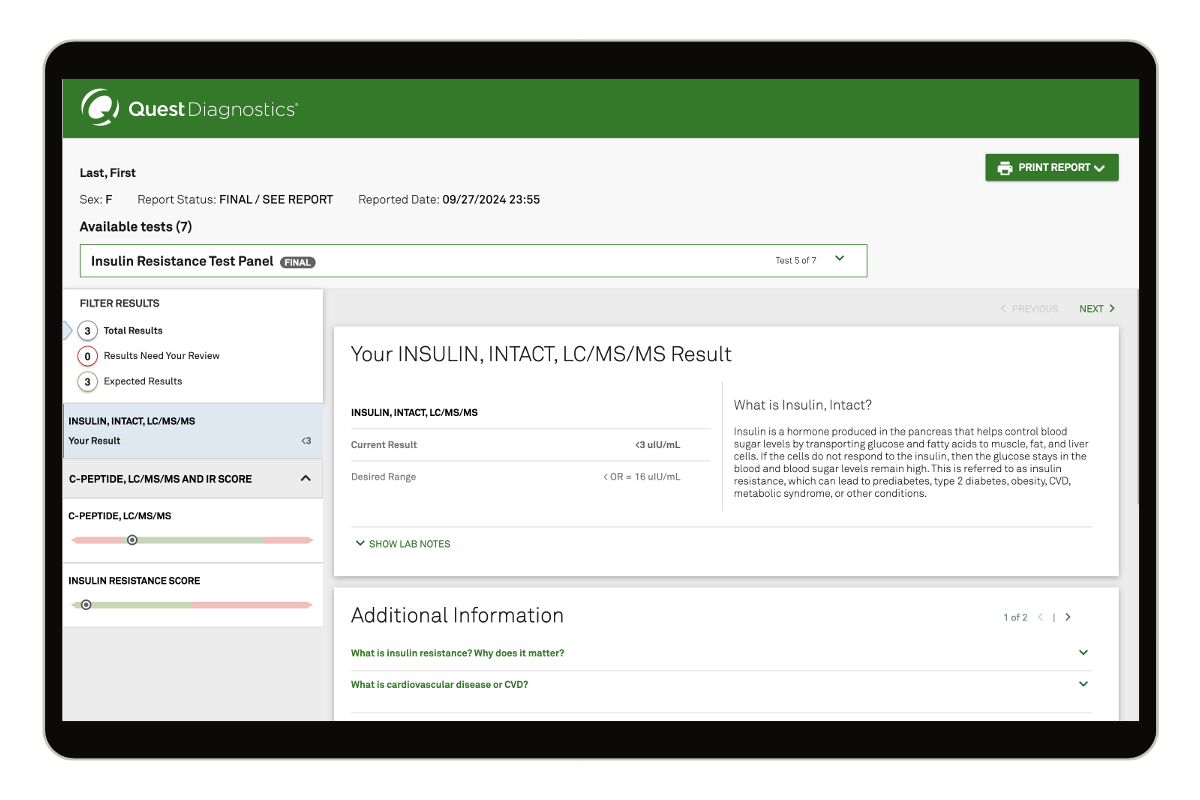Insulin Resistance Test Panel
Measure key biomarkers to help you and your healthcare provider assess your risk for insulin resistance, which can progress to type 2 diabetes, cardiovascular disease (CVD), and other serious health complications if left untreated. Read moreThis Insulin Resistance Test Panel measures insulin and C-peptide levels in your blood to assess your risk of insulin resistance. Insulin resistance (IR) is an underlying condition when your body does not respond to insulin, causing high blood sugar levels. If insulin resistance is not identified early, it may lead to many serious health issues like prediabetes, type 2 diabetes, CVD, stroke, and more.
This panel also provides a calculated score based on the insulin and C-peptide values, which is associated with a probability of insulin resistance. The panel and score help identify hidden metabolic risk, even when HbA1c and glucose (blood sugar) levels are normal. A higher score can indicate a higher risk of insulin resistance or developing a serious health issue. Knowing your risk may help you and your healthcare provider identify these issues before they become problematic.
Note: this test does not screen for diabetes and is not meant for those with known diabetes or high blood sugar levels.
With Quest, you can buy insulin resistance testing online and get testing at a nearby location – no doctor’s visit required.
How it works
questhealth.com offers 100+ consumer-initiated Quest Diagnostics lab tests to empower you to have more control over your health journey. Choose from a variety of test types that best suit your needs.
Insulin resistance (IR) is a metabolic condition when the insulin your body makes isn't working as effectively to lower your blood sugar as it normally would, so your body makes more insulin to process the same amount of sugar. Over time, IR may continue to increase and/or pancreatic function may decline, allowing blood glucose and HbA1c levels to elevate. This can be a gradual process and makes early identification of IR difficult.
If IR is left untreated, it can lead to the development of prediabetes and type 2 diabetes mellitus (T2DM). It is also associated with other clinical conditions including hypertension, cardiovascular disease, stroke, Metabolic Dysfunction-Associated Steatotic Liver Disease (MASLD), polycystic ovary syndrome, and certain forms of cancer. Therefore, early identification of IR and intervention can halt or reverse progression of clinical conditions.
- • Quest Diagnostics. Insulin, Intact, LC/MS/MS. Accessed June 5, 2024.
- • QuestCardioIQ® Insulin Resistance Panel with Score | Quest Diagnostics
- • QuestInsulin Resistance: What It Is, Causes, Symptoms & Treatment (clevelandclinic.org)
- • QuestInsulin Resistance and Diabetes | CDC
- • QuestCardio IQ® Insulin Resistance Panel with Score | Test Detail | Quest Diagnostics


